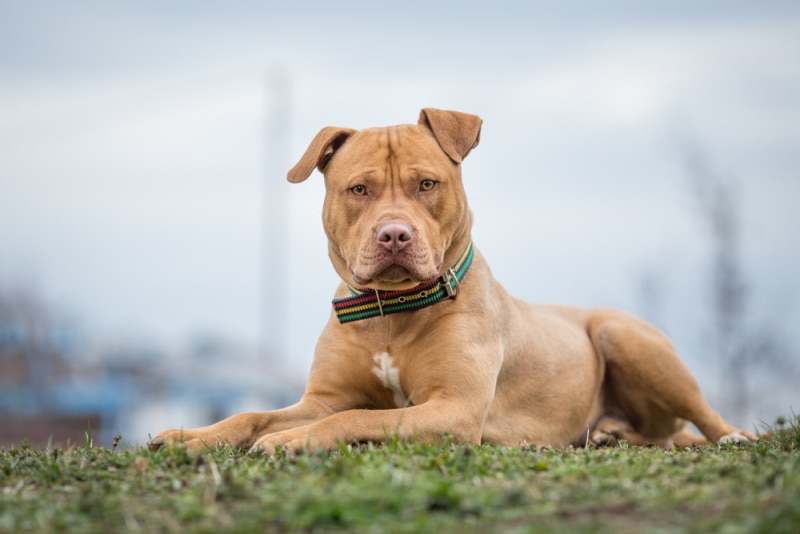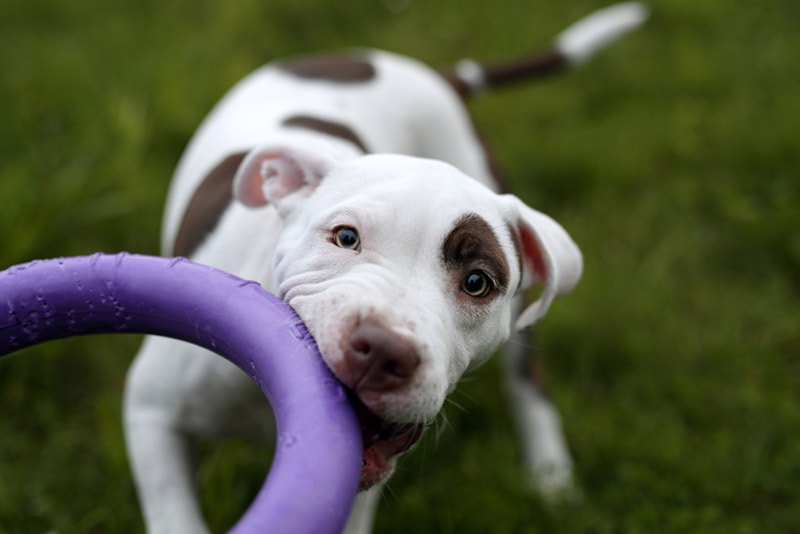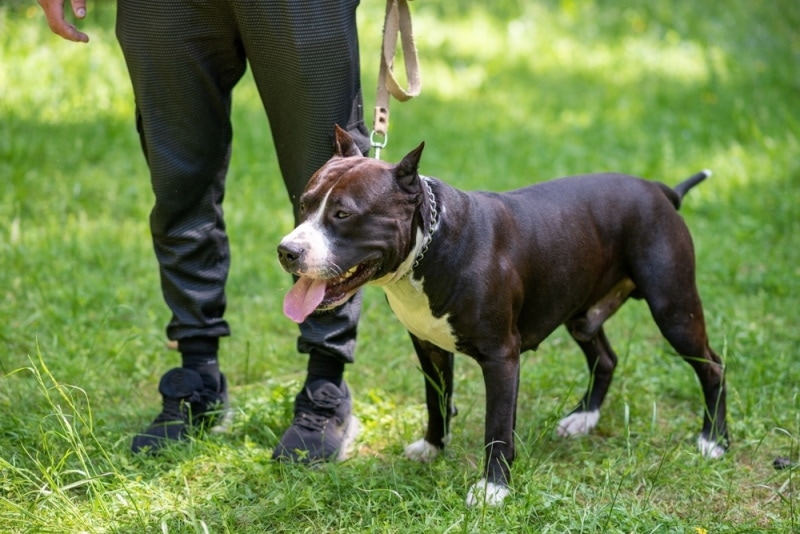Where Are Pitbulls Banned in The US? Ownership Restrictions & FAQ
By Lorre Luther
Updated on

Pitbulls are one of the “breeds” that divide dog lovers. These large, powerful dogs have a reputation for being prone to aggression, which, combined with their powerful bites, leads some to advocate for restrictions on ownership. Others argue that it’s unfair to paint all Pitbulls with one brush and that properly trained and socialized dogs of any breed pose little threat to people or other animals.
Pitbulls are subject to breed-specific restrictions in some countries, including the UK and parts of Canada. But what about the US? Are there states or localities that ban Pitbulls? There aren’t any US states with Pitbull-specific bans, but hundreds of cities and counties restrict ownership of these dogs, including Miami, New York, and Chicago. Read on for more information about Pitbull bans in the US.
 How Do Localities Restrict Pitbull Ownership?
How Do Localities Restrict Pitbull Ownership?
Jurisdictions apply a variety of laws to Pitbull ownership. Some localities have outlawed Pitbulls:
- Miami, Florida
- Prince George’s County, Maryland
- Council Bluffs, Iowa
- Melvindale, Michigan
- Kearny, Missouri
- Sparta, Tennessee
There are also cities and localities that permit Pitbulls but place restrictions on owners or have other requirements to make things legal. San Francisco, California, for instance, doesn’t permit intact Pitbulls in the city, but the exclusion doesn’t apply to spayed or neutered animals.
North Chicago, Illinois, requires owners to obtain a specific Pitbull license. The law also limits the number of Pitbulls an owner may have. New York City doesn’t allow the dogs in public housing. Some jurisdictions, such as Hornell, a small town in New York, require Pitbull owners to register their dogs with the city and provide proof of liability insurance.
Enumclaw, Washington, bans Pitbull ownership but makes several exceptions, most specifically for dogs who pass the American Kennel Club’s Canine Good Citizen Test or similar certification. Proof of certification must be provided to the city, and dogs must be re-tested every 2 years to remain legal.
Several states, including South Carolina, Texas, and Virginia, have laws prohibiting municipalities from designating certain breeds as dangerous. Others, including Maine, South Dakota, and Utah, prohibit breed-specific local laws and ordinances. Breed-specific bans are now prohibited in Florida, but the state allows standing legislation to remain in effect, so Miami’s Pitbull ban still stands.

What’s The Best Way to Determine if Pitbulls Are Legal Where I Live?
Start by looking at local ordinances. Most cities and counties have information about local dog ownership requirements on their websites. There are often grandfathered cities and municipalities in states where there are now laws prohibiting breed-specific legislation, so the only real way to know if Pitbulls are legal in a particular jurisdiction is to look closely at any applicable local laws and regulations.
Are There Other Restrictions to Keep in Mind?
Yes. Finding housing with Pitbulls can often be challenging, as many landlords either don’t allow pets or refuse to permit specific breeds. Finding homeowners or renters insurance can also be difficult; several large companies won’t write policies for households with certain dog breeds, often including Pitbulls.
While having a Pitbull can make it more difficult to find insurance coverage, some companies evaluate pets on a case-by-case basis, and a few, like State Farm, don’t have breed-specific policy exclusions. You may still have problems obtaining insurance if your dog has a history of biting or aggression.
Consider having your pet certified as a Canine Good Citizen through the AKC’s program if you have a sweet, loving Pitbull at home, as insurance companies who review pets on a case-by-case basis are often happy to see evidence showing pets are well socialized and have solid obedience skills.

Are There Other Breeds That Are Often Subject to Breed Specific Restrictions?
Yes. Breed-specific ordinances and laws often mention Rottweilers, Dobermans, and wolf-dog hybrids. But determining precisely which dogs these laws apply to can be challenging, particularly when it comes to Pitbulls. The American Kennel Club (AKC) doesn’t recognize the breed, so no US standard describes the dogs covered by these ordinances. On the other hand, the United Kennel Club (UKC) acknowledged American Pit Bull Terriers in the late 19th century. American Staffordshire Terriers and Staffordshire Bull Terriers are commonly described as Pitbulls, as are dogs with similar builds and temperaments related to dogs bred in the 19th century as fighting animals.
Pitbull mixes are often included in these bans and restrictions. Insurance companies regularly exclude homes with Rottweilers, Chow Chows, Dobermans, Huskies, Mastiffs, and Cane Corsi from homeowners or renters insurance eligibility.
What Do Major Organizations Say About Breed-Specific Legislation?
The AKC opposes breed-specific legislation because it’s costly, ineffective, and often difficult to enforce. Many of these laws include general descriptions of prohibited dogs, making it difficult for owners to prove that the ordinance doesn’t cover a pet.
The American Veterinary Medical Association (AVMA) describes breed-specific legislation as “inappropriate and ineffective,” specifically arguing that statistics can’t accurately identify dangerous breeds, partly because canine aggression results from several interacting factors, including ancestry, socialization, training, and health.
The Humane Society of America argues that these bans are based on myths and result in dogs being sent to shelters when owners can’t find housing or obtain insurance. Most animal welfare organizations support breed-neutral dangerous dog laws that target specific actions instead of entire breeds.
Organizations supporting breed-specific legislation often cite the high number of Pitbull attacks and the severe injuries victims incur. They also point to Pitbulls’ sheer athleticism and power and the potentially serious consequences if one slips out of an unlocked gate or breaks a leash after being triggered.

 Conclusion
Conclusion
While there are a few places around the world where Pitbulls are illegal, there are currently no US states with laws prohibiting ownership of these dogs. There are, however, several city and municipal bans and restrictions in jurisdictions around the US. While a few cities ban Pitbull ownership entirely, others require Pitbull owners to take steps such as obtaining a special license or presenting the city with proof of liability insurance that kicks in in the event of a dog-bite accident.
Many states have laws prohibiting cities and municipalities from enacting breed-specific bans, although some have exceptions, such as grandfather clauses for municipalities with existing restrictions.
See Also:
Featured Image Credit: Lunja, Shutterstock
 How Do Localities Restrict Pitbull Ownership?
How Do Localities Restrict Pitbull Ownership?









